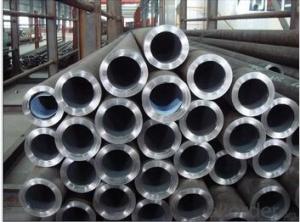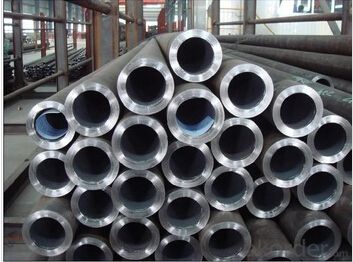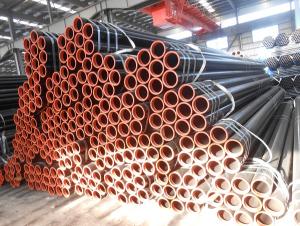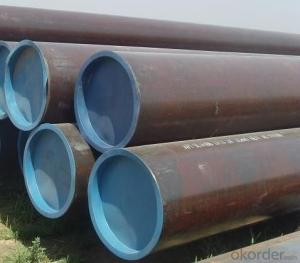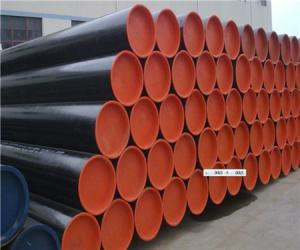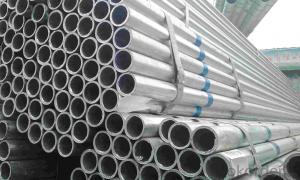seamless steel pipe for liquid transportation
- Loading Port:
- Shanghai
- Payment Terms:
- TT OR LC
- Min Order Qty:
- 25 m.t.
- Supply Capability:
- 5000 m.t./month
OKorder Service Pledge
Quality Product, Order Online Tracking, Timely Delivery
OKorder Financial Service
Credit Rating, Credit Services, Credit Purchasing
You Might Also Like
Packaging & Delivery
| Packaging Detail: | plastic caps ,bevelled ends , in bundles, EXPORTE STANDARD PACKING |
| Delivery Detail: | 30 days |
Specifications
seamless steel pipe for liquid transport
SEAMLESS STEEL PIPE
Specification
| Name | SEAMLESS STEEL PIPE |
| Standard | seamless steel pipe |
| Material Grade | GR.A B,10#,20#,35#,45#,A106,A36,16Mn(Q345B),X42-X70, p11,p22,p9,p5 or as client's demands |
| Outer Diameter | 1/8-36inch(10.3mm-914.4mm) |
| Thickness | WT:3-60mm (SCH10 TO SCH160) |
| Length | 5.8m,6m,11.8m,12m,or as per order |
| SApplication | for manufacture of pipeline,vessels,equipment,pipe fittings and steel structures for conveying gas,water and oil in both the oil and natural gas industries for manufacturer wall panel,ecomomizer,reheater,superheater and steam pipeline of boilers. For conveying oil,gas and other fluid |
| Delivery | As difference required sizes and quantities ( normally 30-45days) |
| Payment | T/T, Irr L/C at sight. |
- Q: How do steel pipes handle ground settlement?
- Steel pipes are generally robust and durable, making them well-suited for handling ground settlement. The flexibility and strength of steel allow the pipes to withstand the shifting and settling of the ground without significant damage. Steel pipes have a high resistance to deformation, which means they can maintain their shape and structural integrity even when the ground settles or moves. When the ground settles, steel pipes can accommodate the movement by flexing and bending slightly. This flexibility allows them to adjust to changes in the ground without breaking or cracking. Additionally, steel pipes are often designed with joints that can absorb and distribute stress caused by ground settlement. Furthermore, steel pipes have a smooth interior surface that minimizes friction and resistance to the flow of materials. This feature is particularly important when the ground settles because it reduces the likelihood of clogs or blockages due to debris or sediment settling in the pipes. In summary, steel pipes are well-equipped to handle ground settlement due to their strength, flexibility, and resistance to deformation. They can adapt to the movement of the ground without compromising their structural integrity, making them a reliable choice for various applications, including underground infrastructure and pipeline systems.
- Q: Can steel pipes be used for underground cooling systems?
- Indeed, underground cooling systems can make use of steel pipes. Thanks to their durability, strength, and resistance to corrosion, steel pipes are widely employed in numerous applications, including underground cooling systems. They are adept at handling the rigorous demands of cooling systems, such as high pressure and temperature requirements. Moreover, steel pipes can be conveniently installed and maintained by means of welding or threading them together. Nonetheless, it is crucial to ensure that the steel pipes are adequately coated or insulated in order to avert corrosion and uphold heat transfer efficiency.
- Q: Will the steel tube dance?
- In a single pole dance performance, the dancer moves more naturally, herself, moves and techniques, and does what she wants to do, while the style of dance is determined by herself, no one intervenes, and quite free.
- Q: How do you select the right size of steel pipe for a project?
- To select the right size of steel pipe for a project, one must consider factors such as the intended purpose, the flow rate or pressure requirements, the material being transported, and any applicable building codes or regulations. Consulting engineering specifications, pipe size charts, and professional advice can help in determining the appropriate size that will meet the project's requirements and ensure optimal performance and safety.
- Q: How are steel pipes connected to other plumbing components?
- Steel pipes are typically connected to other plumbing components through various methods such as threaded connections, welding, or using compression fittings.
- Q: What is the size of seamless steel tube DN150?
- Seamless steel pipe having a hollow cross section, used as a conduit for conveying fluids, such as pipelines for transporting petroleum, natural gas, gas, water, and certain solid materials. Compared withsteel and roundsteelinsolid, flexural torsional strength in the same time, the weight is light, is a kind of economic section steel, widely used in the manufacture of structural parts and mechanical parts, such as the oil pipe, automobile transmission shaft, the bicycle frame and steel construction with scaffold with steel pipe manufacturing ring parts can be improved the utilization rate of materials, simplify the manufacturing process, material saving and working hours, has been widely used to manufacture steel tube.
- Q: Can steel pipes be used for oil refinery applications?
- Yes, steel pipes can be used for oil refinery applications. Steel pipes offer many advantages for oil refinery applications including high strength, durability, and resistance to corrosion. They are able to withstand high pressure and temperature conditions that are common in oil refinery operations. Steel pipes are also easy to transport and install, making them a popular choice for oil refinery projects. Additionally, steel pipes can be customized to meet specific requirements such as size, thickness, and coating, making them suitable for a wide range of oil refinery applications.
- Q: How are steel pipes used in the wastewater treatment industry?
- Steel pipes are commonly used in the wastewater treatment industry for various purposes such as carrying and distributing wastewater, transporting chemicals, and constructing infrastructure like tanks, pumps, and treatment units. The strength, durability, and corrosion resistance of steel pipes make them ideal for handling the harsh and corrosive nature of wastewater, ensuring efficient and reliable operation of the treatment processes.
- Q: How long do steel pipes last?
- Steel pipes can last for several decades, typically around 50 to 100 years, depending on various factors such as the quality of the steel, the environment they are exposed to, and proper maintenance and care.
- Q: What are the safety precautions when working with steel pipes?
- When working with steel pipes, it is important to follow safety precautions to minimize the risk of accidents and injuries. Some key safety measures include wearing appropriate personal protective equipment (PPE) such as gloves, safety glasses, and steel-toed boots to protect against cuts, burns, and falling objects. It is crucial to use proper lifting techniques or equipment when handling heavy steel pipes to avoid strains or back injuries. Additionally, workers should be cautious of potential hazards such as sharp edges, welding sparks, or exposure to hazardous materials. Regular inspection and maintenance of equipment and tools is necessary to ensure their safe operation. Proper training, awareness of surroundings, and adherence to safety protocols are essential for a secure working environment when dealing with steel pipes.
Send your message to us
seamless steel pipe for liquid transportation
- Loading Port:
- Shanghai
- Payment Terms:
- TT OR LC
- Min Order Qty:
- 25 m.t.
- Supply Capability:
- 5000 m.t./month
OKorder Service Pledge
Quality Product, Order Online Tracking, Timely Delivery
OKorder Financial Service
Credit Rating, Credit Services, Credit Purchasing
Similar products
Hot products
Hot Searches
Related keywords
